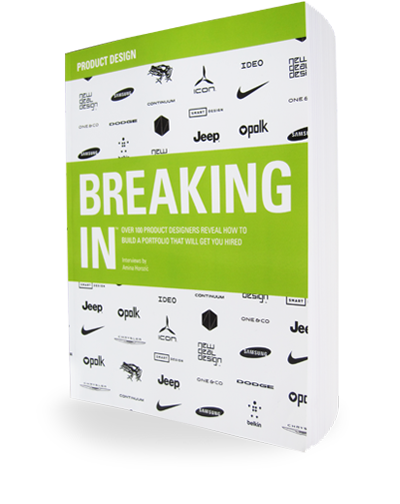Check out some great work from Leonardo Massarelli.
AH: What kinds of portfolios get your attention these days? What brings in an industrial designer for an interview?
LM: It’s been awhile since I’ve seen a portfolio that captured our attention. But, I’d say that the first impression is the general layout of the portfolio, which denotes the aesthetic quality the candidate has towards design. Typography, colors, care with the images and composition. After the first layout impression, I search for the quality of the products presented. Sketch, 3D, and rendering ability are very important to provide a good impact and impression.
Finally, the most important thing is the relevance of the candidate’s design ideas. What is the product intended to do? For whom? What’s its context? The holistic thought in the development of a product is important in our evaluation.
AH: What do you expect to learn from a designer during an interview?
LM: I expect the candidate to have, not only good professional references, but also to know the history of design and to be up-to-date with design trends, technology, methods, and so forth.
AH: What characteristics or qualities would you say make a successful designer?
LM: General knowledge. I believe a good designer must have accumulated diverse knowledge. They must be a generalist by nature. Being able to see context with a different point-of-view is one of the differentiators we bring to projects we participate in, and this view depends on our accumulated knowledge and experiences. In our company we call this ability “creative pollination.” Working in several market segments keeps our repertoire always full with new information.
AH: How do you personally feed your own inner-generalist outside the work context?
LM: Through natural curiosity. I think it is an inner, primitive habit. I consume a lot of information through blogs, magazines, and through my diverse group of friends.
[ … ]
AH: Can you tell me more about the experience of starting your own design agency at just 21? What motivated you? What were some tough lessons you learned? What propelled you to keep going forward?
LM: On one hand it was terrible, but on the other it was terrific. Many years went by where my partner and I lived with almost no money. All of our friends had some income, either through working in the industry or landing a job in a studio. But, we had nothing, except a lot of worry. We found liberty in having the ability to create our own way of thinking and designing, however. This created a possibility for us to see design without boundaries. We think creatively through challenges. We did so from the beginning—and it worked for us.
[ … ]
AH: Any final words of wisdom for the young, budding product designers?
LM: Think about design and do design. There are too many people out there today just talking about design, and very few doing design.

Leonardo Massarelli of Questto|No

Comments are closed.